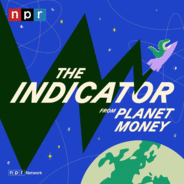We are just at the start of hurricane season, and we're already seeing the danger and tragedy brought on by storms. There's another cost that gets much less attention, but it's a gamble everyone in the path of a storm has to make.Today on the show, we examine the decision on whether or not to evacuate from an oncoming disaster. Based on the digital story: 1 reason people don't evacuate for hurricanes? Rising costs, and they're getting pricierRelated episodes:Hazard maps: The curse of knowledgeUnintended Consequences, Hidden DeathsThe brewing recovery in Western North CarolinaFor sponsor-free episodes of The Indicator from Planet Money, subscribe to Planet Money+ via Apple Podcasts or at plus.npr.org.Learn more about sponsor message choices: podcastchoices.com/adchoicesNPR Privacy Policy

Wirtschaft
The Indicator from Planet Money Folgen
A bite-sized show about big ideas. From the people who make Planet Money, The Indicator helps you make sense of what's happening in today's economy. It's a quick hit of insight into money, work, and business. Monday through Friday, in 10 minutes or less.
Folgen von The Indicator from Planet Money
300 Folgen
-
Folge vom 09.07.2025Can you afford to evacuate ahead of a disaster?
-
Folge vom 08.07.2025Will the tax cuts pay for themselves?The One Big Beautiful Bill Act is now law. It's expected to cost the government a pretty penny. The Congressional Budget Office predicts a $3.4 trillion increase in the deficit over ten years. This is driven by significant tax cuts, including extensions of those made in 2017. Trump's advisors argue the tax cuts will pay for themselves. Today on the show, we speak with the guru on that school of thought, Arthur Laffer, and dig into some of those claims with a tax economist. Related episodes: The simple math of the big bill (Apple / Spotify) What's going to happen to the Trump tax cuts? (Apple / Spotify) So, how's this No Tax On Tips thing gonna go? (Apple / Spotify) For sponsor-free episodes of The Indicator from Planet Money, subscribe to Planet Money+ via Apple Podcasts or at plus.npr.org. Fact-checking by Corey Bridges. Music by Drop Electric. Find us: TikTok, Instagram, Facebook, Newsletter. Learn more about sponsor message choices: podcastchoices.com/adchoicesNPR Privacy Policy
-
Folge vom 07.07.2025Why can't we insure trees?In the U.S., we insure most everything we sell. So why not trees? Today on the show why trees aren't insured like other crops, and what it would take to get that insurance with extreme weather events on the rise. Related episodes: When insurers can't get insurance (Apple / Spotify) For sponsor-free episodes of The Indicator from Planet Money, subscribe to Planet Money+ via Apple Podcasts or at plus.npr.org. Fact-checking by Tyler Jones. Music by Drop Electric. Find us: TikTok, Instagram, Facebook, Newsletter. Learn more about sponsor message choices: podcastchoices.com/adchoicesNPR Privacy Policy
-
Folge vom 04.07.2025One of the cheapest ways to save a life is going away (EXTENDED VERSION)This episode was first published as a bonus episode for our Planet Money+ listeners. Today, we're making it available for everyone! U.S. aid helped Eswatini and Lesotho, two small countries in southern Africa, in their efforts to treat and curb the spread of HIV. Will President Trump's "America First" foreign policy threaten years of progress there against the virus? In this bonus episode, we're featuring an extended conversation between Darian Woods and Jon Cohen, senior correspondent with Science magazine. They talk about Jon's reporting trip to Eswatini and Lesotho in May and the early impacts he saw of the Trump administration's foreign aid cuts. We also hear about the critical role of PEPFAR (the U.S. President's Emergency Plan For AIDS Relief) in the global response to HIV/AIDS and some other things we couldn't fit into the original episode.You can read Jon's recent article in Science magazine here.To hear more bonus episodes like this, and get Planet Money and The Indicator without sponsor messages, support the show by signing up for Planet Money+. This summer, we're also giving Planet Money+ supporters early access to new episodes. Another reason to join! Sign up via Apple Podcasts or at plus.npr.org.Learn more about sponsor message choices: podcastchoices.com/adchoicesNPR Privacy Policy
